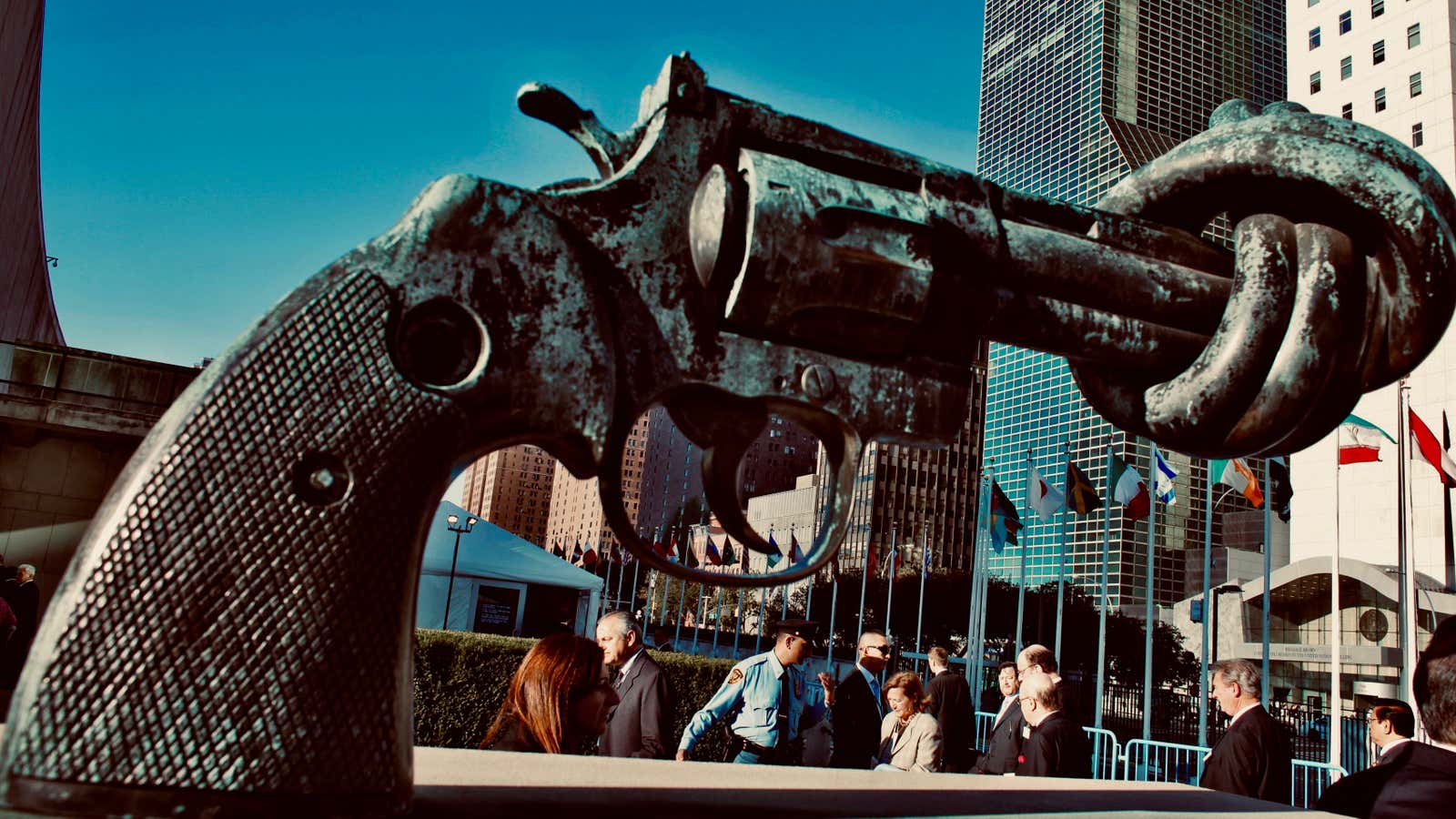On Monday (Dec. 2), the US Supreme Court will hear one of the most anticipated and disputed cases of the term, a gun rights fight that pits New York City against the New York State Rifle and Pistol Association (NYSRPA). The matter has politicians on the left and right up in arms, inspiring unusually unfriendly amicus briefs and strange letters to the court.
The case arises from a New York City gun transport ban that limited licensed gun owners’ ability to travel with firearms. The state rifle and pistol association sued the city, alleging violations of the Constitution’s Second Amendment right to bear arms. But New York state passed a law addressing the complaints—arguably in an effort to avoid a high court ruling that might expand gun rights—and the city adjusted its rules, too. NYC has been arguing that there is no more controversy ever since.
Still, the justices agreed to hear the matter and asked the parties to be prepared to argue mootness. That is, whether the claim is even still ripe for consideration in view of the subsequent legislative fixes.
If they decide it is, and they opine on the substance of the case, it’ll be the most consequential gun rights matter in a decade, since the 2010 case McDonald v. City of Chicago, according to George Washington University law professor Robert Cottrol, speaking at a Federalist Society event in October. In McDonald the justices ruled that an individual’s Second Amendment rights are incorporated and applied to states via the Due Process clauses. It limited localities’ ability to restrict guns, which is why many states and cities have signed amicus briefs pleading with the justices not to decide the substantive questions presented here.
New York City and those localities don’t want the justices to consider the constitutional claim and say there’s nothing left to decide. The Constitution’s Case or Controversy Clause forbids the justices from issuing advisory opinions—there must be a live controversy to resolve and some kind of relief it can offer an aggrieved party. The city says that with the new laws in place, old gun transport restrictions need not be considered.
Republicans, the Trump administration, and the NYSRPA are eager for a ruling on the constitutional grounds because they believe the high court bench is primed for a decision favorable to gun owners. With five conservative justices and only four progressives, a decision expanding gun rights, or at least chiding the city, is entirely possible.
Cottrol noted that Clarence Thomas, Samuel Alito, Neil Gorsuch, and Brett Kavanaugh all seem to “favor a strong view of the Second Amendment.” Yet he stopped short of making bets and notably omitted the chief justice from this list of strong gun rights supporters.
That’s perhaps because the court hasn’t been quite as predictable as pundits have expected of late and because John Roberts might play a moderating force between progressives and conservatives in this case, especially in view of the inflammatory rhetoric it has generated thus far. Roberts may or may not be the bench’s new swing voter, but he certainly dislikes it when anyone—Republican or Democrat—implies the court is a political institution and that the justices are anything but neutral arbiters of the law.
Deciding not to decide on the gun rights questions here, citing mootness, offers the court a legitimate out of this political and cultural pickle. It would be a conservative response in the true, constitutional sense of conservatism. While this sure feels like a live controversy because Americans are riled up about guns—owning and controlling them—the court could simply defuse this controversy by refusing to rule on outdated legislation, declining to issue what would essentially be an advisory opinion, an editorial about the Second Amendment.
The NYSRPA argues that the controversy is live because its members could still be affected in the future by the past law, for example if violations of the old law came up in gun licensing applications. The federal government has joined the NYSRPA in urging the justices to decide on the merits of the Second Amendment claims, rather than rule the fight is moot. The US solicitor general, Noel Francisco, on Nov. 15 filed a letter to the court arguing that the controversy is still live because the gun association members could seek damages for past injuries under the old law.
The city counters both of these claims. It says that past transport ban violations won’t affect future licensing. The NYC Law Department argues, too, that the NYSRPA members never sought money damages. They wanted declaratory and injunctive relief—a ruling that allowed them to exercise their rights. But they never sought compensatory relief, or cash for their injuries. Nor is it clear that they could. And the city says it’s far too late to start arguing that’s the basis for the case now.
On Monday, the justices will hear from the federal government, NYC, and the gun group. They’ve already received about 50 amicus briefs in the matter from educators, politicians, law professors, police groups, linguists, and both gun control activists and gun rights advocates.
Whatever the justices decide, they have until late June before they issue an opinion.
